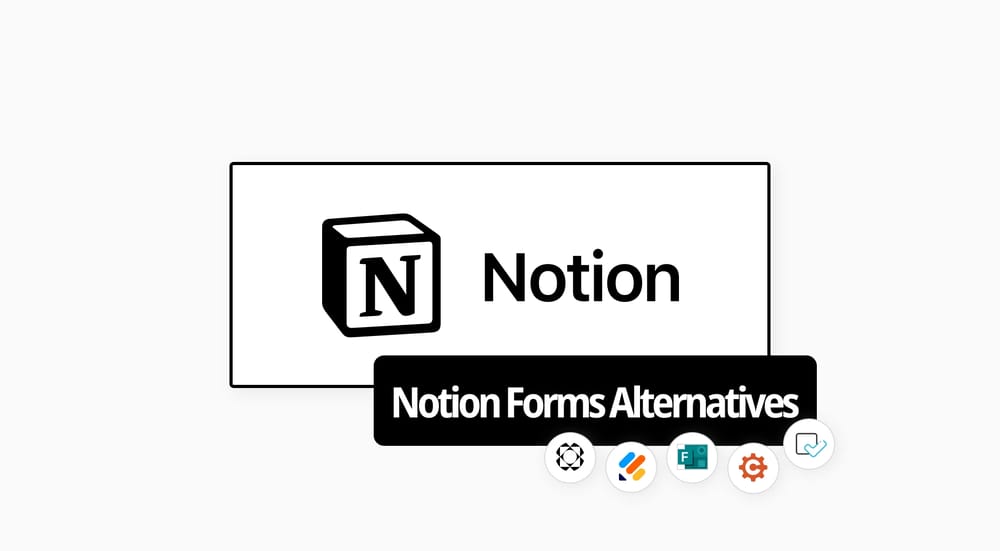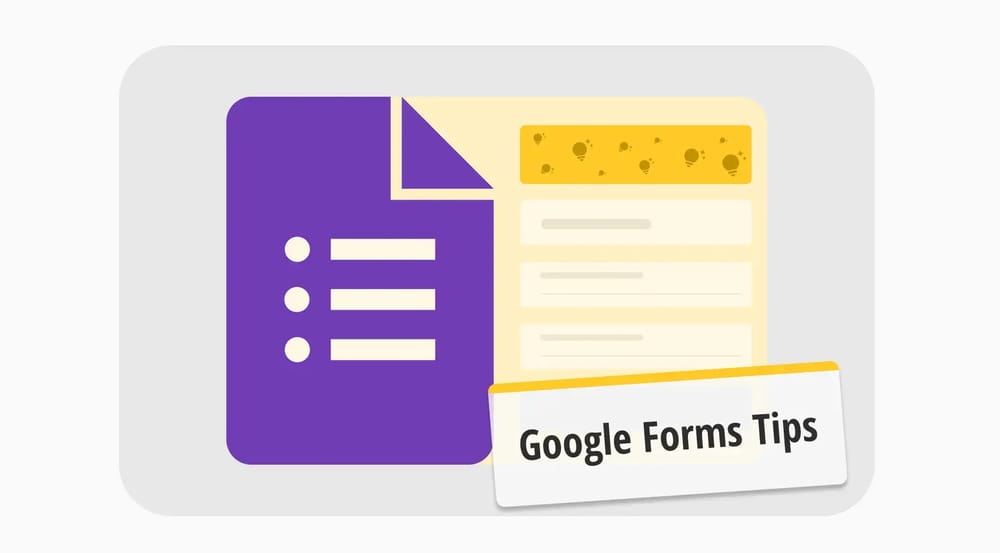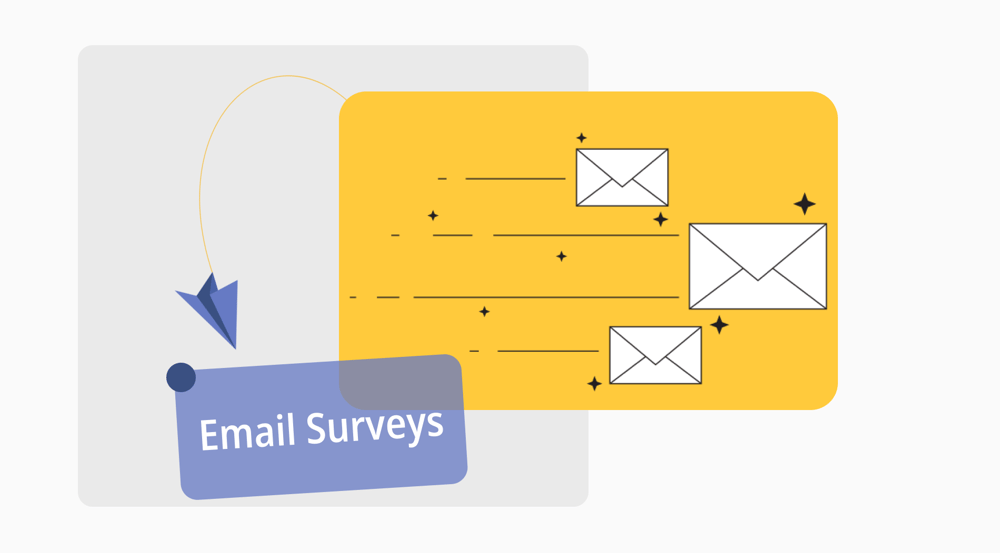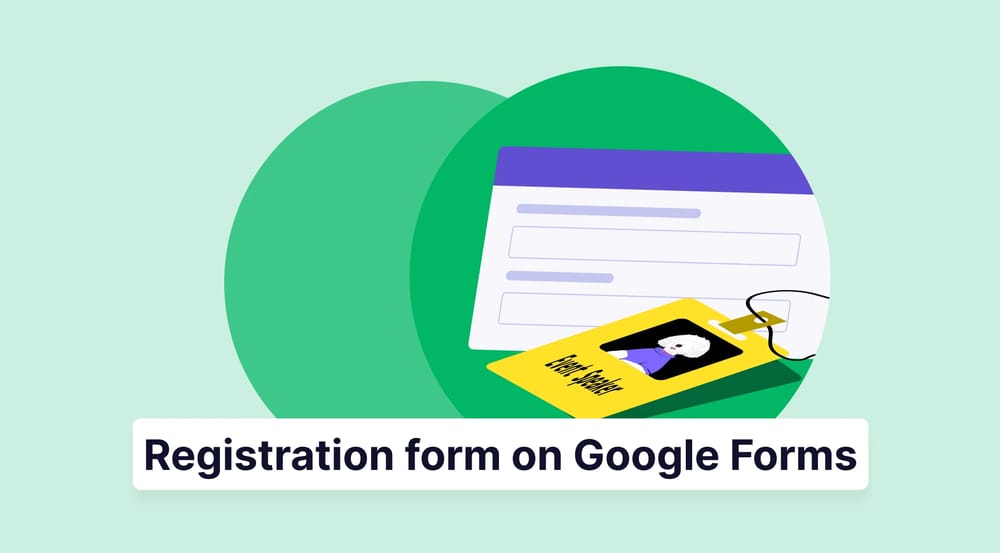La création de formulaires est devenue essentielle pour les entreprises, les éducateurs et les créateurs de contenu. Bien que Notion soit un outil de prise de notes, peu d'autres outils de gestion de projet offrent des fonctionnalités de formulaire qui améliorent votre flux de travail. Si vous recherchez des alternatives aux formulaires Notion, cette liste vous aidera à explorer les meilleures options pour vos besoins.
Il existe différents constructeurs de formulaires, chacun répondant à des besoins et des attentes différents. Notion Forms, un outil polyvalent, est souvent utilisé pour la collecte de données, la collaboration d'équipe, le suivi de projet et la collecte de commentaires. Cet article explore les 10 meilleures alternatives simples aux formulaires Notion, offrant chacune des fonctionnalités uniques pour la création de formulaires afin que vous puissiez trouver la meilleure solution pour vos besoins et objectifs spécifiques.
À propos des formulaires Notion
Notion Forms est un outil puissant conçu pour s'intégrer parfaitement à l'espace de travail de Notion, améliorant la collecte de données, le suivi de projet et la collaboration d'équipe au sein de la plateforme. Lorsque vous utilisez Notion, vous tapez /form et créez un constructeur de formulaires dans votre page Notion. Voici quelques-unes de ses principales fonctionnalités :
🔗 Option d'intégration : Vous pouvez intégrer des formulaires sur votre site web en utilisant un code d'intégration simple, ce qui facilite leur intégration dans votre page. Cependant, les options de personnalisation détaillées de l'intégration sont limitées, de sorte que l'accent est mis sur un affichage de formulaire simple sans style ou fonctionnalités avancées supplémentaires. Cette approche permet de simplifier les choses et de les rendre fonctionnelles pour les besoins de base en matière de formulaires.
🚫 Types de champs limités : Il n'y a que dix types de champs et de questions dans les formulaires Notion. Vous pouvez utiliser les types de champs et de questions Texte, Choix multiple, Date, Personne, Fichiers et médias, Nombre, Case à cocher, Mail, URL, Téléphone lors de la création d'un formulaire dans Notion Forms.
🔄 Synchronisation des données en temps réel : Les formulaires Notion synchronisent automatiquement les réponses avec Notion, mettant à jour les bases de données en temps réel. Cela permet un accès immédiat aux données, facilitant ainsi la visualisation et l'analyse des réponses au fur et à mesure qu'elles arrivent.
🧩 Intégrations avec des outils tiers: Notion offre des intégrations avec des outils tels que Zapier, permettant une automatisation et une connectivité étendues avec d'autres plateformes, telles que Google Sheets et Slack.
📤 Options d'exportation de données: Les réponses aux formulaires peuvent être facilement exportées dans des formats tels que CSV, ce qui facilite le partage de données avec des applications externes ou la réalisation d'analyses approfondies en dehors de Notion. Les réponses peuvent également être affichées sous différentes formes, telles que tableau, liste graphique, etc.
Tarification des formulaires Notion:
Notion propose quatre plans payants, à commencer par un plan gratuit pour les particuliers, qui comprend des fonctionnalités essentielles telles que des outils de collaboration et des analyses de base. Le plan Plus (12 $/mois) ajoute des fonctionnalités plus orientées vers les équipes, tandis que le plan Business (18 $/mois) inclut des outils avancés tels que SAML SSO et des analyses étendues. Le plan Entreprise propose des options sur mesure pour les grandes organisations, notamment la provision d'utilisateurs SCIM et des contrôles de sécurité robustes, avec une tarification disponible sur demande.
Meilleures alternatives aux formulaires Notion que vous devez essayer
Il existe de nombreuses alternatives aux formulaires Notion, mais voici dix alternatives flexibles et meilleures que les alternatives pour les créateurs de formulaires aujourd'hui.
1. forms.app
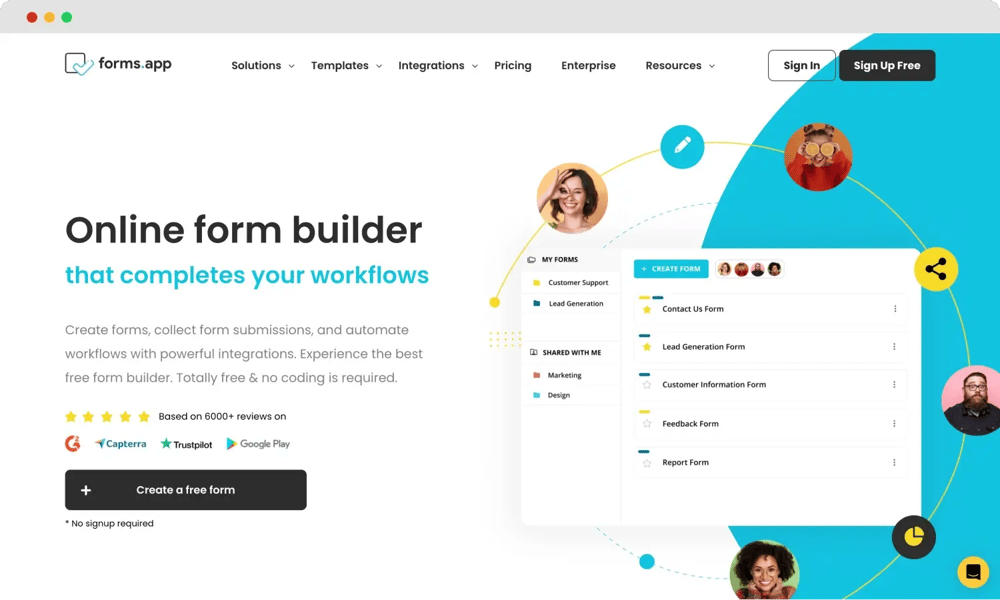
La page d'accueil de forms.app
forms.app offre, en tant qu'excellente alternative à Notion, un créateur de formulaires en ligne flexible idéal pour les enquêtes, les inscriptions et divers autres besoins de collecte de données. Il combine facilité d'utilisation avec une gamme puissante d'options de personnalisation, permettant aux utilisateurs de créer des formulaires professionnels sans expertise technique. Bien que forms.app propose des intégrations et des analyses robustes, les utilisateurs à la recherche de rapports avancés ou d'options de branding étendues pourraient le trouver quelque peu limité.
Points forts
- Personnalisation avancée : forms.app permet aux utilisateurs de personnaliser le design du formulaire, des couleurs et des polices jusqu'à la mise en page globale, assurant une forte cohérence de marque dans la gestion des tâches.
- Logique conditionnelle : Avec les capacités de logique conditionnelle de forms.app, les formulaires peuvent s'adapter dynamiquement en fonction des réponses des utilisateurs. Par exemple, une question ne peut apparaître que si un répondant choisit une réponse particulière dans un champ précédent.
- Bibliothèque de modèles : forms.app offre une vaste bibliothèque de modèles couvrant plusieurs industries et cas d'utilisation, des sondages aux formulaires de commande.
- Plan gratuit à vie : forms.app offre un plan gratuit plus généreux, permettant la création de formulaires illimitée, 150 réponses par mois et l'accès à des fonctionnalités avancées telles que la logique conditionnelle et les intégrations.
Tarification
- Plan Gratuit ✅
- Plan de Base : 25 $ par mois
- Plan Pro : 35 $ par mois
- Plan Premium : 99 $ par mois
2. SurveyMonkey
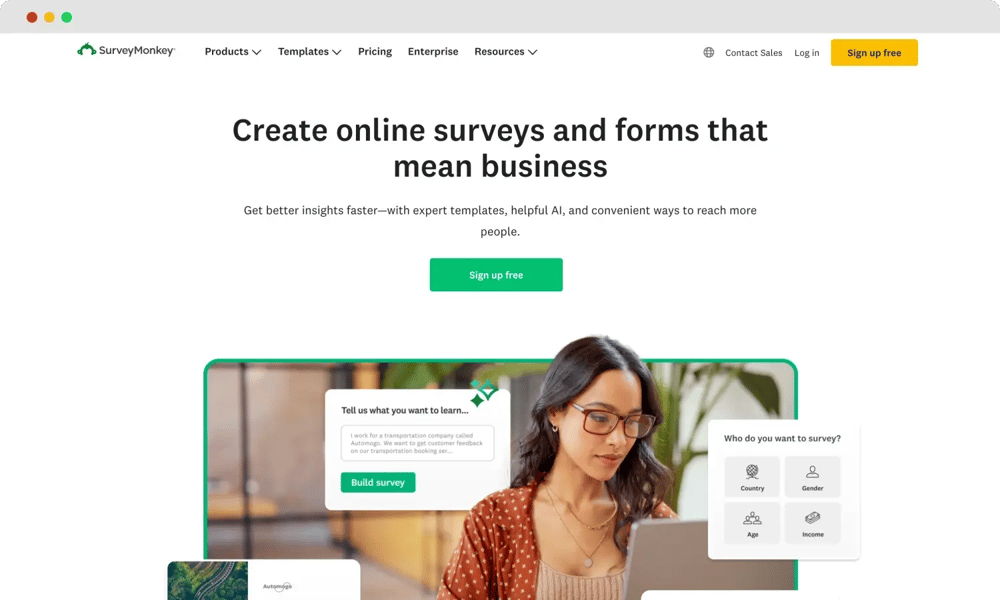
La page d'accueil de SurveyMonkey
SurveyMonkey est l'un des outils de sondage les plus reconnus, offrant de nombreux types de questions, modèles et analyses approfondies. Connu pour ses capacités de sondage puissantes, il convient particulièrement à la collecte de commentaires professionnels, bien que de nombreuses fonctionnalités avancées nécessitent un abonnement premium.
Points forts
- Analytiques et outils de sondage robustes : Analyses intégrées pour des données en temps réel et des tendances de réponse, similaires à Notion.
- Publics ciblés : Accès à des échantillons pour des informations spécifiques aux groupes démographiques.
- Modèles spécifiques à l'industrie : Modèles adaptés à différents secteurs tels que la santé et les affaires.
Tarification:
- Plan gratuit ✅
Plans d'équipe
- Avantage d'équipe: 25 $/utilisateur par mois (Facturé annuellement uniquement)
- Premier d'équipe: 75 $/utilisateur par mois (Facturé annuellement uniquement)
Plans individuels
- Mensuel standard: 99 $ par mois
- Annuel avantage: 39 $ par mois (Facturé annuellement uniquement)
- Annuel premier: 119 $ par mois (Facturé annuellement uniquement)
- Entreprise: Tarification personnalisée
3. Google Forms
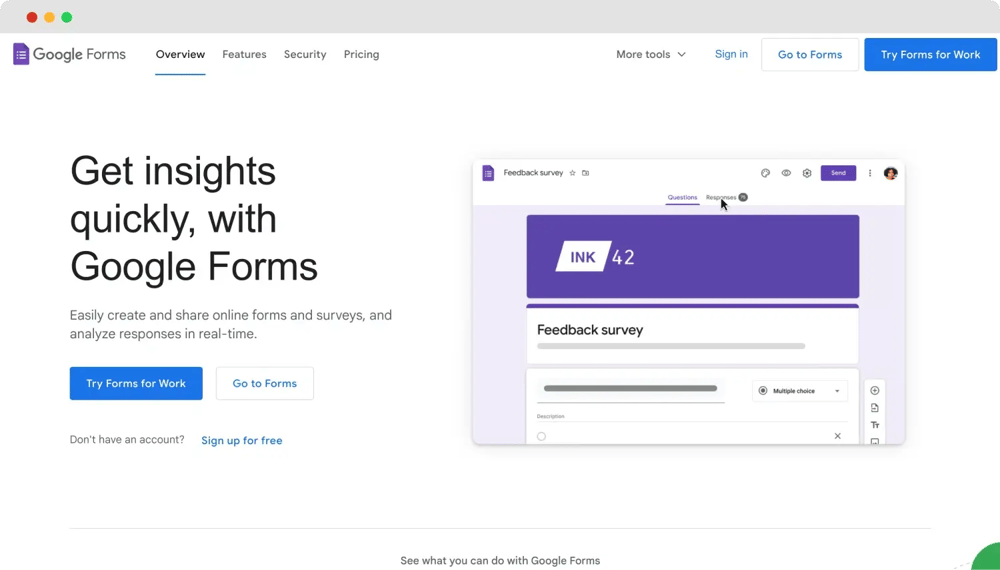
La page d'accueil de Google Forms
Une option simple et gratuite, Google Forms est idéale pour les sondages et quiz de base. Il s'intègre facilement avec Google Sheets, Google Calendar, Google Docs et Google Drive, ce qui en fait un excellent outil pour la collecte et l'analyse de données rapides malgré l'absence d'options avancées d'analyse et de personnalisation.
Points forts
- Interface conviviale: Design simple et accessible aux débutants.
- Collaboration en temps réel: Plusieurs utilisateurs peuvent travailler sur des formulaires simultanément.
- Intégration avec Google Workspace: Facilité d'organisation des données dans l'écosystème de Google.
Tarification:
Plan gratuit ✅
Fonctionnalités Premium: Disponibles via les plans Google Workspace, à partir de 6 $ par mois pour le plan Business Starter.
4. Microsoft Forms
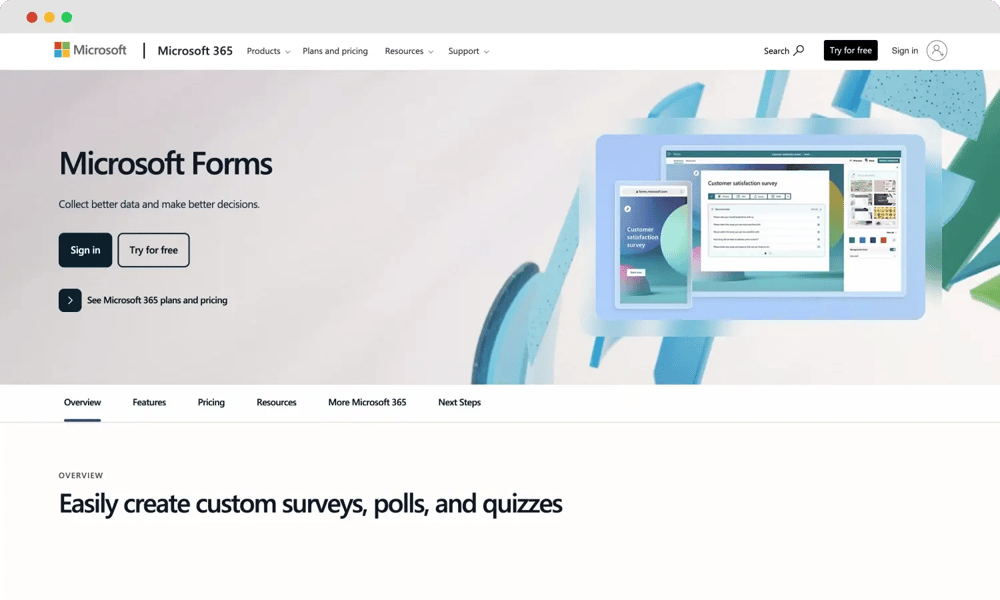
La page d'accueil de Microsoft Forms
Microsoft Forms, une partie de la suite Microsoft 365, permet aux utilisateurs de créer des sondages, des quiz et des sondages. Il s'intègre bien avec les produits Microsoft, ce qui en fait un outil idéal pour les utilisateurs déjà dans l'écosystème Microsoft.
Points saillants
- Intégration transparente avec Microsoft 365: Fonctionne sans effort avec Excel, Outlook et d'autres applications Microsoft.
- Tableau de bord d'analyse simple: Fournit des informations de base pour les données de réponse.
- Modèles pour l'éducation et les entreprises: Comprend des modèles adaptés à des besoins spécifiques.
Tarification
Cette plateforme est gratuite ✅
Plans Microsoft 365 pour les entreprises (facturés annuellement uniquement)
- Business Basic: 6 $ par mois
- Business Standard: 12,50 $ par mois
- Business Premium: 22 $ par mois
Plans Microsoft 365 pour la maison
- Microsoft 365 Family: 9,99 $ par mois
- Microsoft 365 Personal: 6,99 $ par mois
5. Jotform
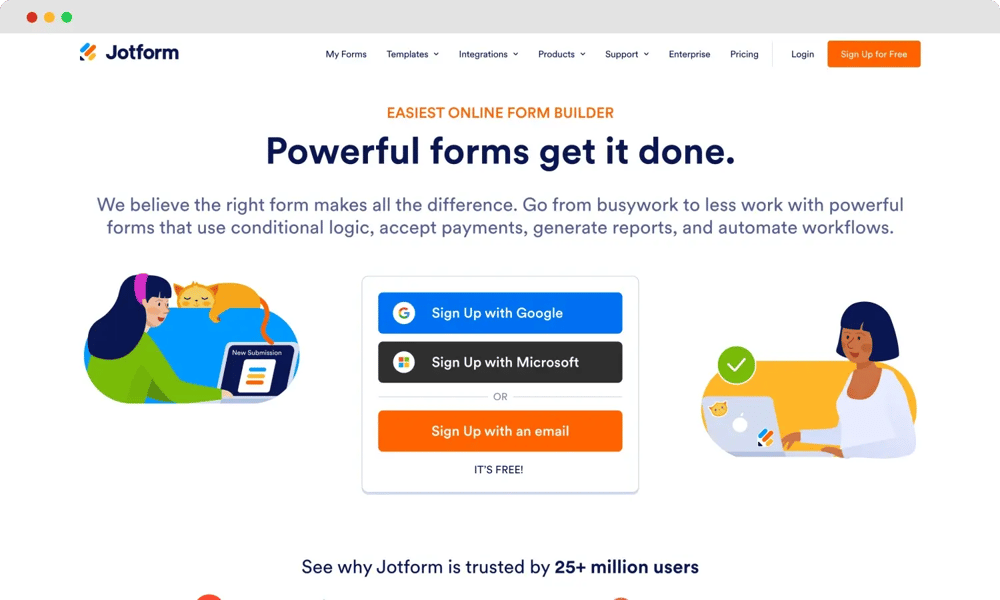
La page d'accueil de Jotform
Jotform est connu pour son interface intuitive de glisser-déposer et sa vaste gamme de types de formulaires. Avec une personnalisation et une automatisation avancées, Jotform est un excellent choix pour les utilisateurs qui ont besoin de rationaliser les flux de travail, bien que cela puisse être coûteux pour les fonctionnalités premium.
Points saillants
- Grande collection de modèles: Plus de 10 000 modèles dans différents secteurs.
- Logique conditionnelle et branches: Permet des formulaires dynamiques en fonction des réponses.
- Conformité HIPAA: Convient aux soins de santé et à d'autres secteurs traitant des données sensibles.
Tarification
Plan gratuit ✅
- Bronze: 39 $ par mois
- Silver: 49 $ par mois
- Gold: 59 $ par mois
- Entreprise: Tarification personnalisée
6. Cognito Forms
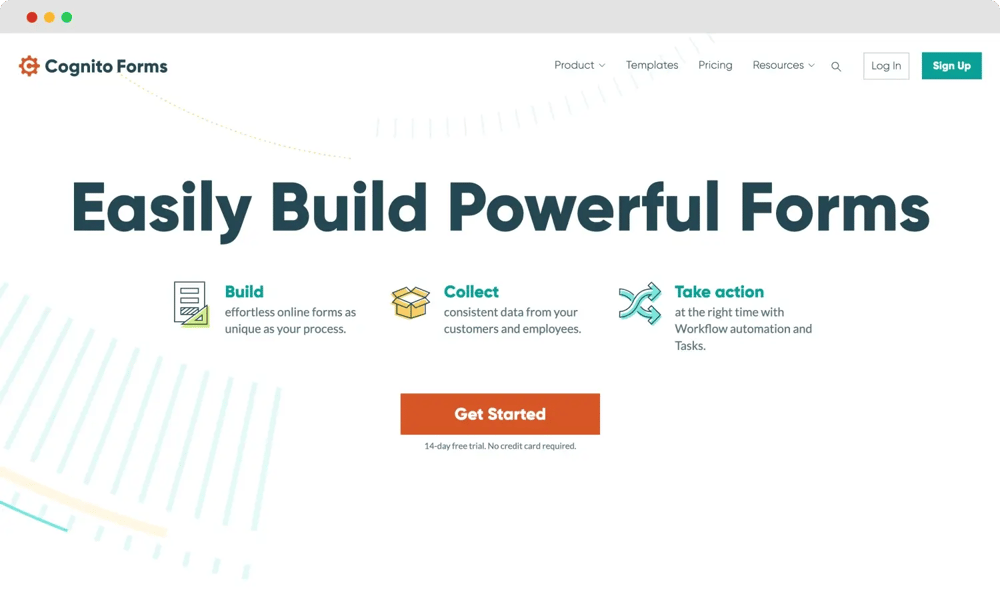
La page d'accueil de Cognito Forms
Cognito Forms offre des fonctionnalités avancées telles que des calculs et la génération de documents, ce qui en fait l'outil idéal pour les formulaires nécessitant une manipulation de données plus complexe. Il est robuste mais peut nécessiter un apprentissage pour les fonctionnalités plus avancées.
Points forts
- Sections répétées : Idéal pour les formulaires avec plusieurs ensembles de données dans une seule soumission.
- Options d'exportation de données : Exportez vers Excel, PDF, etc., pour les rapports.
- Téléchargement de documents : Permet aux utilisateurs de collecter des documents en toute sécurité.
Tarification
- Plan gratuit ✅
- Pro : 15 $ par mois
- Équipe : 35 $ par mois
- Entreprise : Tarification personnalisée
7. Typeform
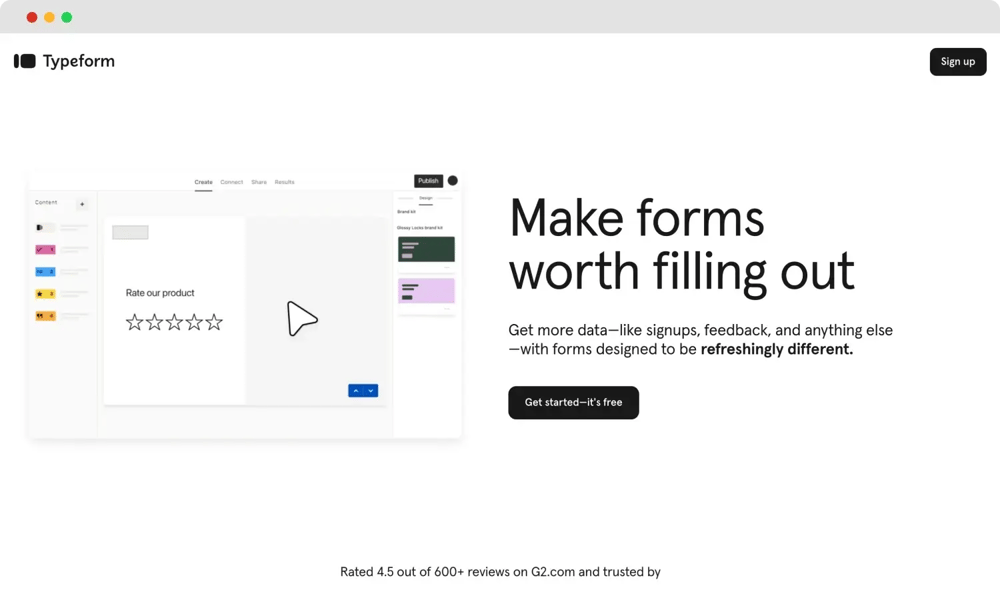
La page d'accueil de Typeform
Typeform est connu pour ses formulaires conversationnels et attrayants qui améliorent l'expérience utilisateur. Bien que sa version gratuite soit limitée, elle est idéale pour ceux qui accordent de l'importance à l'interaction et à l'esthétique des utilisateurs.
Points forts
- Formulaires conversationnels : Offre une expérience interactive avec une seule question à la fois.
- Sauts logiques : Permet une logique de branchement pour un parcours utilisateur personnalisé.
- Tableau de bord d'analyse : Fournit des statistiques de base sur l'engagement des utilisateurs.
Tarification
- Plan gratuit ✅
- Basique: 29 $ par mois
- Plus: 59 $ par mois
- Entreprise: 99 $ par mois
- Entreprise: Tarification personnalisée
8. ProProfs Quiz Maker
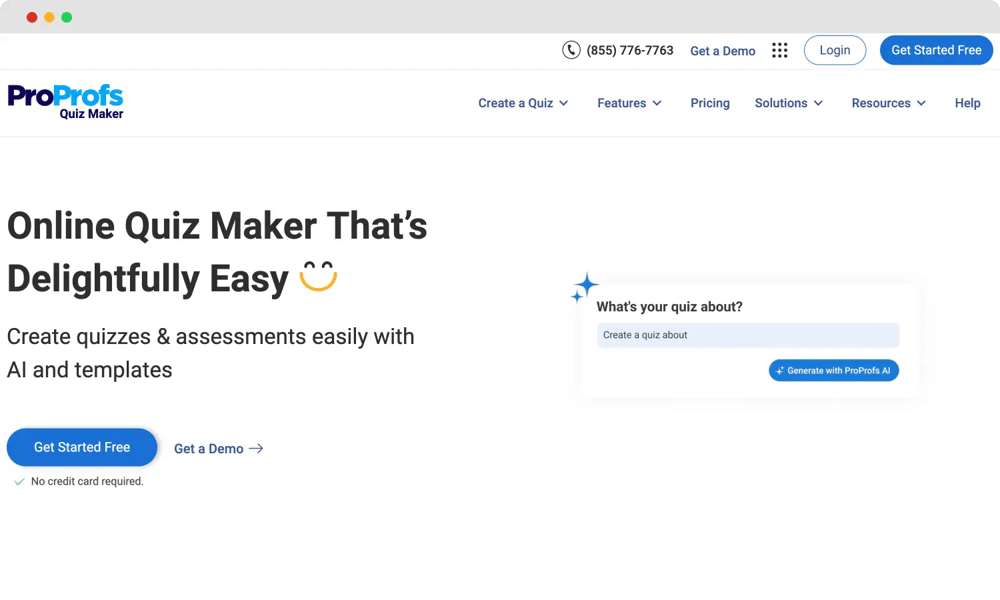
La page d'accueil de ProProfs Quiz Maker
ProProfs Quiz Maker simplifie la création de quiz avec ses fonctionnalités alimentées par l'IA, sa vaste bibliothèque de questions et ses outils anti-triche. Idéal pour les éducateurs, les formateurs et les recruteurs, cet outil vous permet de créer des quiz notés, des tests de personnalité et des évaluations sécurisées en quelques minutes. Ses fonctionnalités remarquables comprennent l'évaluation automatisée, le support multilingue pour plus de 70 langues et les analyses en temps réel.
Points forts
- Créateur de quiz IA: Générez des questions et des explications instantanément en fournissant un sujet.
- Mesures anti-triche: Surveillance, questions aléatoires, prévention du changement d'onglet, et plus encore.
- Marque personnalisée: Personnalisez les quiz avec votre logo, votre thème et des certificats personnalisés.
- Rapports avancés: Informations en temps réel sur les performances des apprenants, la difficulté des questions, et plus encore.
Tarification
- Plan gratuit ✅
- Essentiel: 19,99 $ par 100 utilisateurs de quiz actifs/mois
- Entreprise: 39,99 $ par 100 utilisateurs de quiz actifs/mois
- Entreprise: À partir de 199,99 $ par mois
9. Formstack
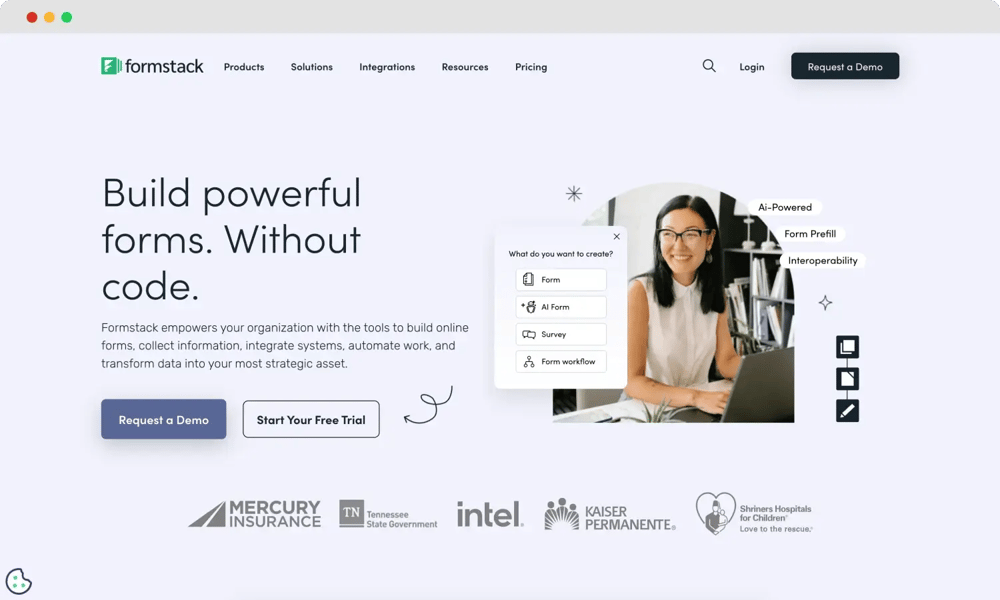
La page d'accueil de Formstack
Formstack est conçu pour les flux de travail professionnels, offrant des fonctionnalités avancées telles que les signatures électroniques, l'automatisation des flux de travail et la conformité HIPAA. C'est un outil puissant mais peut être coûteux pour les petites équipes.
Points saillants
- Automatisation des flux de travail: Automatise les tâches pour améliorer l'efficacité.
- Sécurité des données: Conforme à HIPAA et GDPR pour les industries sensibles aux données.
- Accès à l'API: Intègre profondément d'autres systèmes d'entreprise.
Tarification
- Formulaires: 99 $ par mois
- Suite: 299 $ par mois
- Entreprise: Tarification personnalisée
10. Paperform
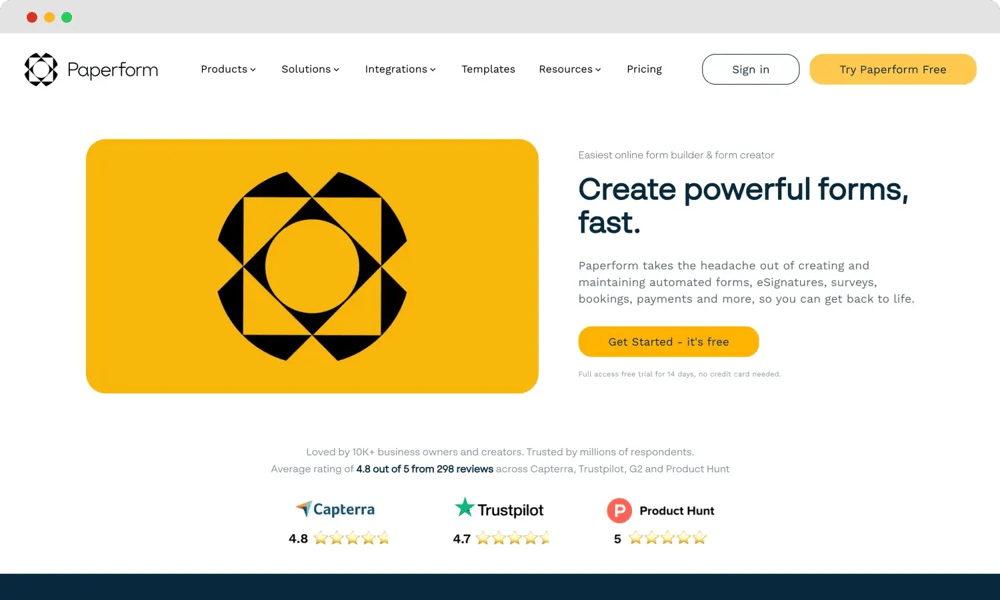
La page d'accueil de Paperform
Paperform combine la création de formulaires avec des fonctionnalités de boutique en ligne, ce qui en fait un choix idéal pour le commerce électronique. Ses formulaires esthétiques et personnalisables peuvent gérer tout, des inscriptions aux ventes de produits, créant ainsi une base de connaissances complète pour votre entreprise.
Points saillants
- Prêt pour le commerce électronique: Options de paiement intégrées pour la vente en ligne.
- Design personnalisable: Alignez les formulaires avec l'identité de votre marque.
- Intégrations: Fonctionne avec des applications telles que Mailchimp, Zapier et Slack.
Tarification
- Plan gratuit ❌ (essai gratuit de 14 jours)
- Essentials: 29 $ par mois
- Pro: 59 $ par mois
- Business: 129 $ par mois
- Entreprise: Tarification personnalisée
11. Fillout
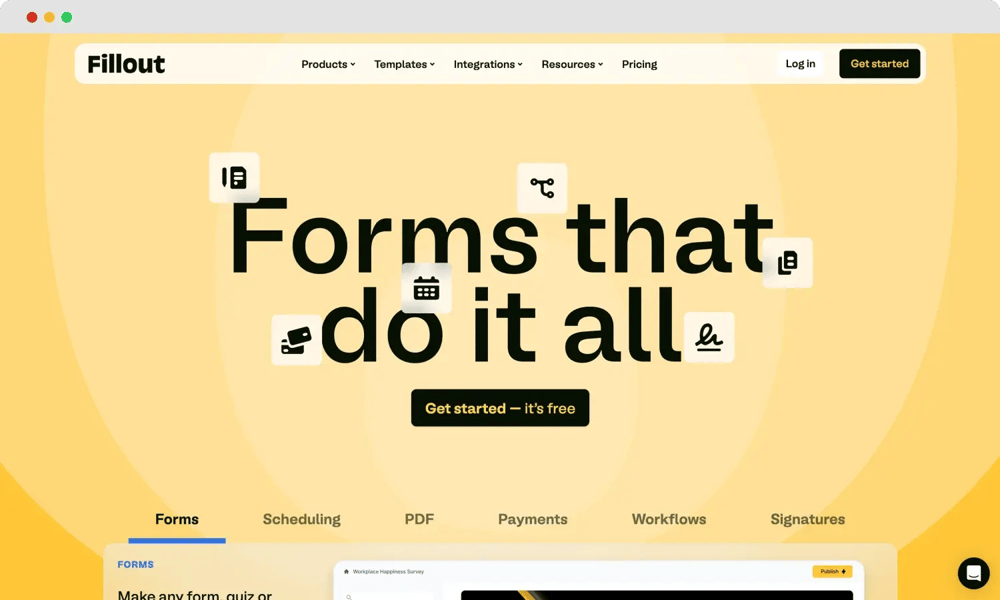
La page d'accueil de Fillout
Fillout offre simplicité avec des fonctionnalités robustes, en en faisant un excellent choix pour les sondages, les candidatures et la collecte de données avec une logique conditionnelle. Vous pouvez ajouter des vues graphiques esthétiques à votre formulaire, ce qui en fait un meilleur outil de productivité.
Points forts
- Formulaires personnalisables: Ajustez les couleurs, les logos et les thèmes.
- Logique conditionnelle: Rationalisez les formulaires avec des options de branchement.
- Exportation facile des données: Téléchargez les données pour l'analyse et les rapports.
Tarification
- Plan gratuit ✅
- Débutant: 19 $ par mois
- Professionnel: 49 $ par mois
- Entreprise: 89 $ par mois
Bonus: Comment intégrer des formulaires sur les pages Notion?
En suivant ces étapes, vous pouvez efficacement intégrer des formulaires dans vos pages Notion pour une collecte de données et une interaction transparentes. Avec la fonction d'intégration de Notion, vous pourrez recueillir des commentaires et gérer des tâches directement dans Notion:
- Créez votre formulaire: Utilisez un outil de création de formulaires (comme Google Forms, Jotform ou Typeform) pour créer votre formulaire.
- Obtenez le code d'intégration: Après avoir créé votre formulaire, copiez le code d'intégration ou le lien du formulaire fourni par Notion. Cela se trouve généralement dans les options de partage.
- Ouvrez Notion: Accédez à la page Notion où vous souhaitez intégrer le formulaire.
- Collez le code d'intégration: Tapez /embed et sélectionnez l'option "Intégrer". Ensuite, collez le code d'intégration dans le champ prévu.
- Ajustez la taille: Redimensionnez le formulaire intégré pour qu'il s'adapte correctement à la mise en page de votre page Notion.
Les formulaires intégrés Notion faciliteront la collecte de données lorsque vous partagez vos pages Notion.
Questions fréquemment posées sur les formulaires Notion
Si vous avez encore des questions sur les formulaires Notion, cette section est là pour répondre à toutes vos questions. Que vous vous demandiez quelles sont ses fonctionnalités, sa tarification, ses intégrations ou ses options de personnalisation, nous avons tout prévu. Notre objectif est de fournir des réponses claires et complètes pour que vous puissiez faire le meilleur choix pour vos besoins en matière de création de formulaires sans aucune incertitude.
Notion vous permet de créer et de gérer des formulaires personnalisables, y compris des formulaires de contact, d'inscription, de candidature à un emploi et de commentaires. Les réponses sont automatiquement stockées dans des bases de données dédiées Notion, améliorant ainsi l'organisation et l'analyse.
Notion est une application gratuite, mais certaines fonctionnalités, intégrations et outils de formulaire externes peuvent entraîner des coûts associés. Bien que vous puissiez utiliser Notion gratuitement, l'intégration de formulaires à partir de services tiers peut nécessiter un abonnement à ces services, en fonction de leur structure de tarification.
Notion AI utilise un mélange de technologies d'intelligence artificielle, principalement en utilisant des modèles de OpenAI, y compris ceux qui alimentent ChatGPT. Cette intégration permet aux utilisateurs de générer du contenu, de résumer des notes et d'automatiser diverses tâches au sein de la plateforme Notion.
Comment choisir la meilleure option de création de formulaire pour vos besoins
Lorsque vous choisissez le bon constructeur de formulaire pour votre entreprise, il y a quelques critères essentiels à prendre en compte. Chaque outil offre des fonctionnalités uniques et répond à différents objectifs commerciaux, il est donc important de garder vos priorités à l'esprit pour faire le meilleur choix. Voici quelques conseils pour vous guider :
💸 Tenez compte de votre budget : Regardez la structure tarifaire de chaque plateforme pour déterminer si elle correspond à votre budget. Certains outils, comme Google Forms, offrent un plan gratuit, tandis que d'autres ont des abonnements à plusieurs niveaux en fonction de l'utilisation et des fonctionnalités.
⚖️ Évaluez les ensembles de fonctionnalités : Énumérez les fonctionnalités essentielles pour vos besoins, telles que les intégrations de commerce électronique, les analyses ou les modèles personnalisables. Vérifiez si l'outil offre une logique conditionnelle, des options d'exportation de données et une personnalisation de la marque pour répondre aux besoins de votre entreprise.
✍🏼 Définissez vos priorités : Classez les fonctionnalités par ordre d'importance. Par exemple, si la facilité d'utilisation et la configuration rapide du formulaire sont des priorités absolues, choisissez des outils qui excellent dans la simplicité, comme forms.app ou Google Forms. Si les rapports avancés sont plus importants, envisagez des options comme SurveyMonkey ou Formstack.
🧩 Vérifiez les capacités d'intégration : Choisissez un outil qui fonctionne parfaitement avec vos applications existantes, telles que Google Sheets, Slack ou Notion. Par exemple, vous pouvez intégrer forms.app avec Notion pour envoyer automatiquement les données que vous avez collectées vers une base de données Notion.
🔎 Testez quelques options : La plupart des constructeurs de formulaires offrent des essais gratuits ou des plans gratuits, vous pouvez donc explorer le fonctionnement de chaque outil avant de vous engager.
En tenant compte de ces critères, vous pouvez choisir le constructeur de formulaire qui convient le mieux à vos besoins commerciaux, à votre budget et à vos objectifs à long terme.
- À propos des formulaires Notion
- Meilleures alternatives aux formulaires Notion que vous devez essayer
- 1. forms.app
- 5. Jotform
- 10. Paperform
- Bonus: Comment intégrer des formulaires sur les pages Notion?
- Questions fréquemment posées sur les formulaires Notion
- Comment choisir la meilleure option de création de formulaire pour vos besoins
forms.app, ton créateur de formulaires gratuit
- Nombre illimité de vues
- nombre illimité de questions
- nombre illimité de notifications
